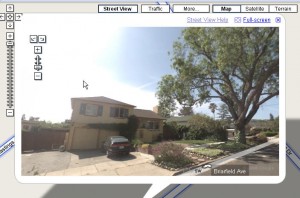by Larry Magid

Street view of home with bedroom window
As if the TV series “To Catch a Predator” wasn’t enough paranoia, now there’s a campaign to protect our children against predators who use Google Street View.
I admit, there may be some privacy concerns as a result of Google taking pictures of homes and businesses around the country but StopInternetPredators.org’s “campaign to highlight child safety concerns over Google’s ‘Street View’ strikes me as absurd. The organization, which is headed by Stacie D. Rumenap, former Deputy Director for the American Conservative Union, argues that Google Street View “can be misused by child predators to target children.”
In a video that appears on the site, Rumenap says that it’s “frighteningly simple” for anyone “to find out detailed photographic information about you and your family.” The video and accompanying text make it seems as if Google Street View is a predator’s best friend for targeting children for abuse. Rumenap calls it “an entirely new threat to our families and children” that “makes it simple to map the most likely route your child walks to school… view entrances to community parks and even find the location of your family’s bedroom windows.” She wants people to “urge local leaders to ban Street View in your neighborhood until the technology is safeguarded.” She does, however, admit that “banning Street View might not safeguard our children 100% from child predators.”
I don’t know where to start with this. To begin with, Google Street View would be a very inefficient way for a predator to find a child victim. It would be much more effective to simply walk or drive around the neighborhood. It’s not as if you need the Internet to find parks, schools and homes where children live and play. There are schools, parks and homes with bedroom windows in just about every neighborhood. And, statistically, the vast majority of predators know their targets anyway — in real life, not online.
Instead of banning Google Street View, maybe we should put up walls between streets and sidewalks so that predators can’t see children walking home from school. And while we’re at it, let’s ban public outdoor parks and recreation areas or at least find ways to hide the children playing there. Or just keep children away from churches, schools, scouting and other places where pedaphiles have been known to operate.
Second, it completely distorts the way predators operate – at least those who are “successful” in finding actual victims. There is plenty of research to show that trolling online for victims is not the way that predators typically find young people to exploit. In about 80% of child sexual abuse cases, the victims and the perpetrator know each other in the real world either through family ties, friendships, schools, youth groups and situations that bring kids and adults together.
Based on what we know from arrest records, survey research and other data, the actual danger of Internet predators, strangers harming victims that they find online has been greatly exaggerated and this campaign simply adds fuel to that fire. If a child is to be harmed online, it is much more likely because of bullying or harassment from a fellow young person, something inappropriate the child posts online or by taking extraordinary risks in a chat room or other public forum.
If anything, campaigns like this actually increase danger to children by alarming people unnecessarily and distracting us from dealing with real risks.
I’m not suggesting that Google Street View doesn’t bring up some privacy concerns. It’s probably a good idea for people to look up their own address just to make sure there’s nothing posted that could be embarrassing or a possible security threat. But finding a serious security risk is pretty unlikely. A Google spokesperson said that “if you are not comfortable with the imagery available on Street View, we have easily accessible tools for flagging sensitive imagery for review and removal.”
And, of course, it’s essential for parents to talk with their children about safety. Adults should study the child safety tips from the National Center for Missing & Exploited Children and remind kids to follow some basic guidelines like “Always check first with a parent, guardian, or trusted adult before going anywhere, accepting anything, or getting into a car with anyone,” “Do not go out alone. Always take a friend with when going places or playing outside” and “Say no if someone tries to touch you, or treats you in a way that makes you feel scared, uncomfortable, or confused. “ That, along with age appropriate parental supervision, is what will protect our kids – not going ballistic about the possible safety implications of every new piece of technology that comes our way.
(Disclosure: I serve as co-director of ConnectSafely.org, a non-profit Internet safety organization that receives financial support from several Internet companies, including Google.)
© 2008 – Larry Magid
